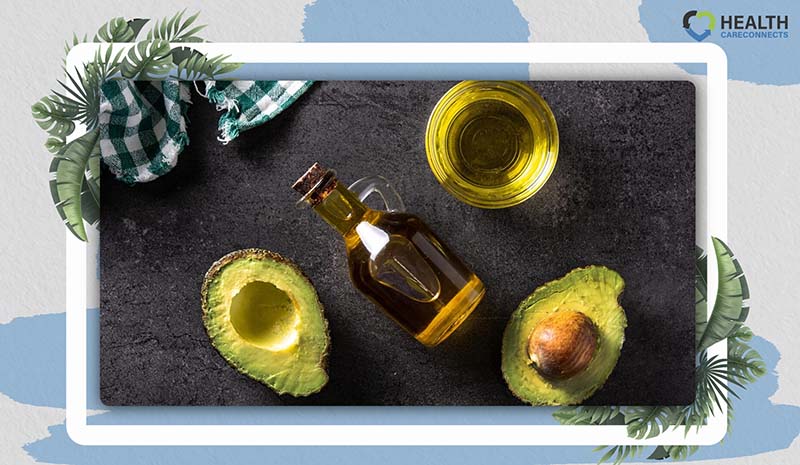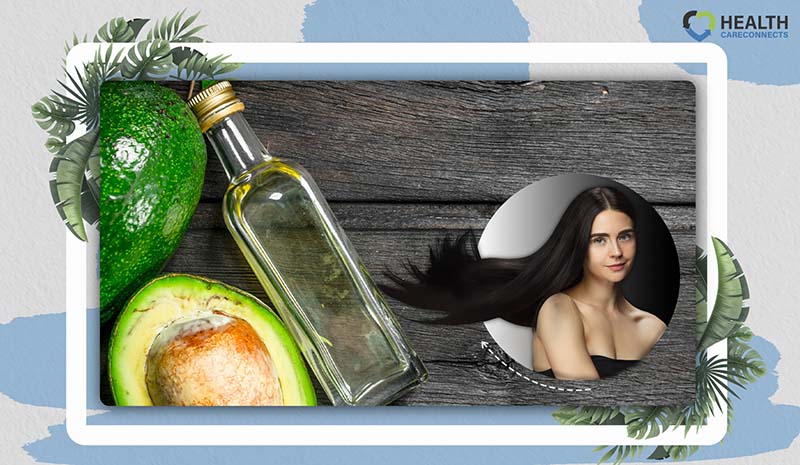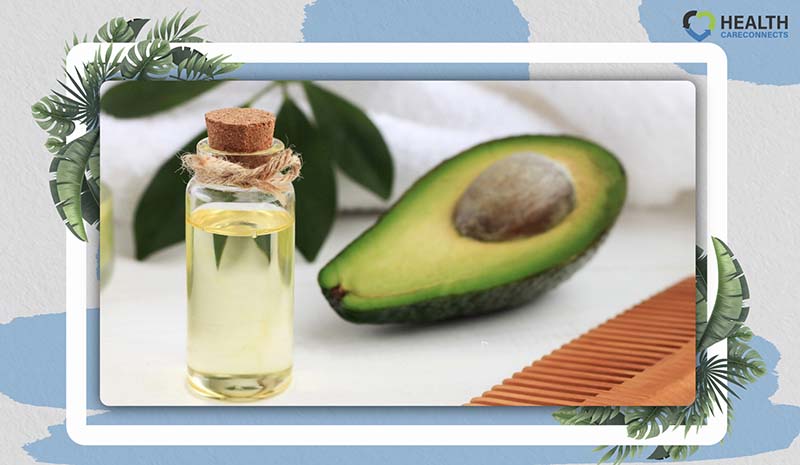Avocado oil is a remarkable natural remedy for hair care, loaded with beneficial nutrients like vitamins, antioxidants, and healthy fats. It offers numerous advantages that can enhance the health and appearance of your hair. This oil is particularly effective at addressing common hair issues such as dandruff and breakage.
Maintaining clean and healthy hair is essential for its overall luster and beauty. Incorporating avocado oil into your hair care routine can significantly strengthen and smooth your hair, leveraging its rich content of beneficial nutrients.
In this article, we will find the answer to the question “Is avocado oil good for your hair?”, explore why avocado oil is beneficial for hair, present the main uses, Identify and discuss any potential risks involved.
Is Avocado Oil Good for Your Hair?
Avocado oil is definitely a boon for hair care. Loaded with essential minerals like potassium and magnesium, along with vitamins such as biotin and antioxidants, it’s a goldmine for promoting hair health. Avocado oil works wonders by smoothing, softening, and repairing hair, locking in moisture, enhancing shine, and thwarting breakage. It’s also effective in reducing flakiness and dryness on the scalp.
Versatile and suitable for all hair types and textures, avocado oil shines particularly bright for those with dry, thick, curly, or natural hair, thanks to its super moisturizing qualities. While it doesn’t directly spur hair growth, it sets the stage for optimal growth by maintaining a healthy scalp and shielding it from excessive shedding.
Moreover, avocado oil can be used in myriad ways, from a pre-shampoo treatment to a nighttime mask, a split end mender, or even as a styling aid. It serves as a fantastic detangler, safeguarding hair from breakage and environmental stressors while imparting a protective shield.

Benefits of Avocado Oil for Hair
Avocado oil boasts a treasure trove of benefits for both hair and skin, thanks to its rich blend of fatty acids, antioxidants, and essential nutrients like Vitamins A and E. Here’s a closer look at some of its standout advantages:
Avocado Oil Penetrates Deeply Into the Hair
Avocado oil is celebrated for its ability to deeply penetrate the hair shaft and scalp. Packed with oleic acid and monounsaturated fats, it moisturizes hair from within, rather than merely coating the surface, offering a non-greasy feel while providing nourishment where it’s needed most.
Avocado Oil Supports a Healthier Scalp
By promoting blood circulation and unclogging follicles, avocado oil fosters a healthier scalp environment, which is crucial for robust hair growth. Its blend of vitamins and lipids not only moisturizes but also combats dryness and flakiness, effectively addressing issues like dandruff.
Avocado Oil Conditions Hair Effectively
Avocado oil is a powerhouse when it comes to conditioning hair. Loaded with antioxidants, biotin, minerals, and essential fatty acids, it seals the hair cuticle, enhancing moisture retention, repairing damage, and fortifying strands against breakage.
Avocado Oil Protects Hair from External Factors
The potent antioxidants beta-carotene and lutein found in avocado oil act as formidable shields against UV damage and environmental pollutants.
Its antioxidant properties not only safeguard hair but also shield the scalp, ensuring overall health and vitality.

Avocado Oil Promotes Faster Hair Growth
Avocado oil’s natural bounty includes biotin and vitamin K, which are believed to promote thicker, longer, and healthier hair.
While it’s not a substitute for clinically proven hair growth treatments like minoxidil, avocado oil creates an optimal environment for hair growth by nourishing the scalp and improving circulation.
Avocado Oil Enhances Hair Shine
Studies have revealed that the minerals potassium and magnesium present in avocado oil can effectively seal cuticle cells, resulting in smoother, shinier hair. This added lustre gives your locks a healthy, vibrant appearance.

Instructions for Using Avocado Oil to Nourish Hair Effectively
To effectively nourish your hair with avocado oil, you have a few options. You can find avocado oil in supermarkets, health shops, or online stores. Here’s how you can use it:
Scalp Massage:
Warm a small amount of avocado oil in a bowl, either by placing it in a jug of hot water or microwaving it for a few seconds.
Gently part your hair and apply a little oil to your scalp using your fingertips or a cotton ball.
Massage the oil into your scalp with small, circular motions using your fingertips.
Leave the oil on your scalp for a short while to allow it to absorb before rinsing it out with your usual shampoo.
Hair Mask:
Mash half of an avocado in a bowl after removing the stone and peel.
Add 1 egg yolk and 1 tablespoon of honey to the mashed avocado and mix the ingredients thoroughly.
Apply the mixture to clean, damp hair and leave it on for about 30 minutes.
Rinse your hair thoroughly and then dry it.
You can use this avocado hair mask treatment once every two weeks if needed.
Conditioner:
After washing your hair with shampoo, which can sometimes dry out hair, use avocado oil as an intensive conditioner.
Apply a small amount of avocado oil to your fingers and run them through your hair from root to tip.
Repeat this process as needed to ensure all your hair is coated with oil.
Leave the avocado oil on your hair for a short while, then rinse it out with warm water.
These methods provide effective ways to incorporate avocado oil into your hair care routine, helping to moisturize your scalp, nourish your hair, and enhance its shine and health.

How Often Should You Apply Avocado Oil to Your Hair?
Avocado oil is an excellent choice for managing very dry hair due to its rich content of vitamins, antioxidants, and healthy fats. For those struggling with dryness, applying small amounts of avocado oil twice daily, once in the morning and once at night, can significantly improve hair texture and hydration.
For individuals with fine or oily hair, using avocado oil more conservatively is recommended. Applying it 2-3 times a week is sufficient. Remember to wash your hair thoroughly after treatment to remove any remaining oils, ensuring your hair remains light and not weighed down.
Who Is Using Avocado Oil on Hair Suitable for?
Avocado oil is universally beneficial for all hair types due to its deep-penetrating properties that nourish both the scalp and hair shaft, making it an exceptional treatment for damaged hair. Its rich composition of nutrients helps restore vitality and strength to stressed strands.
However, individuals with an avocado allergy should avoid using avocado oil to prevent allergic reactions. Those with fine hair should use avocado oil sparingly, applying only a small amount to the lengths of the hair rather than the scalp to prevent weighing the hair down and giving it a greasy appearance.
Is Avocado Oil on Hair Overnight Good or Bad?
Avocado oil, enriched with vitamins, antioxidants, and essential fatty acids, offers significant benefits for hair health. Applying it overnight allows the oil to deeply penetrate the hair shaft, delivering intense hydration and aiding in the repair of damaged hair.
To avoid oil stains on your bedding, cover your hair with a shower cap or wrap it in a towel while you sleep. In the morning, make sure to thoroughly rinse and shampoo your hair to eliminate any residual oil.
For those new to overnight oil treatments, it’s advisable to perform a patch test on a small section of hair first. This helps determine how your hair responds to the treatment before committing to a full application.
Are There Any Risks to Using Avocado Oil for Hair?
If you are allergic or sensitive to avocados, avoid using avocado oil both internally and externally to prevent an allergic reaction.
Before applying avocado oil to your hair and scalp, conduct a patch test on a small area of skin to ensure safety
Applying too much avocado oil might leave your hair feeling greasy. If this occurs, thoroughly wash your hair with a gentle shampoo to remove the excess oil.
Although avocado oil provides excellent lubrication to the hair shaft, which can help prevent further breakage, it is not a cure for serious hair damage. Damage from bleaching, heat treatments, or chemical relaxing cannot be reversed by avocado oil.
Avocado oil is generally safe for most people. However, if you have an avocado allergy, it is wise to consult with your doctor before using it.
FAQs
Is avocado oil suitable for low porosity hair?
Yes, avocado oil is suitable for low porosity hair. It’s lightweight and contains monounsaturated fats, making it easier to penetrate and moisturize the hair without leaving heavy residue. This can be particularly beneficial for low porosity hair, which struggles to absorb products.
How can you use avocado and egg to promote hair growth?
To use avocado and egg for hair growth, create a hair mask by mashing one ripe avocado and mixing it with one egg. Apply this mixture to your hair, focusing on the roots and scalp for stimulation and the lengths for moisture.
Leave it on for about 20 minutes before rinsing with cool water and shampooing as usual. This mask can nourish the scalp and hair, potentially enhancing hair growth due to the proteins and vitamins from the egg and avocado.
Conclusion
In conclusion, hair receives nutrients from the body through the hair shaft. A balanced diet filled with fruits, vegetables, and adequate hydration plays a pivotal role in fostering healthy hair growth. By including avocado oil in your cooking, you can aid in hydrating your hair from the inside out.
Healthy hair, much like healthy skin, is indicative of overall well-being. Consuming nutritious foods, maintaining proper hydration, and getting enough sleep are all fundamental in enhancing hair health.
Regarding hair care, it’s crucial to wash, dry, and regularly trim split ends. Additionally, using avocado oil as a hair mask or conditioner can enhance the shine and overall health of your hair. By incorporating these practices, you support the natural vitality and allure of your hair. Is avocado oil good for your hair? Indeed, it is an excellent addition to both your diet and hair care regimen for healthier, more vibrant hair.
For those seeking more information and honest product reviews, I recommend visiting HealthCareConnect. Explore firsthand experiences from users and gain valuable insights to help inform your decision.

Dr. Joyce Slater: Your Guide to Informed Health Choices
Dr. Joyce Slater shines as a distinguished expert in the field of nutrition and public health. Contributing her vast expertise to HealthConnectbc, she embodies a deep-seated passion for enhancing public well-being. As a respected figure in her field. Dr. Slater’s academic journey and professional achievements are nothing short of inspirational.
Holding a significant position as a researcher and educator, Dr. Slater has delved deeply into the intricacies of food literacy and nutritional science. Her work, prominently featured in numerous esteemed scientific publications, underscores her dedication to expanding our understanding of food’s role in health and society.
At the heart of Dr. Slater’s professional ethos is a profound desire to positively impact individual lives through education and research. She often says, “Empowering people with the knowledge to make healthier choices is the most rewarding aspect of my work.” This principle is the cornerstone of her involvement with HealthConnectbc, where she strives to provide reliable and practical health advice.
Dr. Slater’s contributions to HealthConnectbc are multifaceted: academically, she offers insights into the complex world of nutrition and health, enhancing both public understanding and professional practices. Additionally, she is instrumental in guiding and inspiring the next generation of health professionals, thus fostering future excellence in the field.
Juggling rigorous research with her educational duties, Dr. Slater demonstrates an unwavering commitment to her profession. Her approachable nature and genuine concern transcend the confines of academia, touching the lives of everyone she interacts with. Dr. Slater looks forward to continuing her journey of discovery and education, dedicated to the ongoing improvement of public health and nutrition.
At HealthConnectbc, Dr. J. Slater is not just a contributor; she is a guiding light, dedicated to enlightening and motivating individuals towards a healthier and more informed lifestyle.
PUBLISHED ARTICLES
- Food literacy competencies: A conceptual framework for youth transitioning to adulthood (2018)
- Self-perceived eating habits and food skills of Canadians (2016)
- Challenges to acquiring and utilizing food literacy: Perceptions of young Canadian adults (2016)
- Socio-demographic and geographic analysis of overweight and obesity in Canadian adults (2009)
- Sustainable well-being: Concepts, issues, and educational practices (2014)

